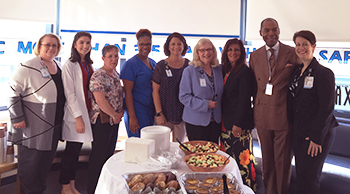In the Transplantation Center, communication + data + commitment = zero

At a recent celebration to mark over a year without a serious safety event were Transplantation Center team members (l-r): Susan Carter, RN; Kelly Flynn, RN; Kelly Grimshaw, RN, service line educator; Andrea Wurrell, RN; Tami Chomicz, RN; Sharon Klein, RN; Francine LoRusso, RN, vice president, Patient Services, Heart and Vascular and Transplantation; Keith Churchwell, MD, senior vice president, Operations and executive director, Heart and Vascular and Transplantation centers; and April Capone, manager, Center for Living Organ Donors.
On June 28, staff with the Yale New Haven Hospital Transplantation Center celebrated over 365 days without a serious safety event. But it took a prior safety event to ramp up the high reliability efforts that got them to zero.
"Staff members really took that safety event to heart," said Tami Chomicz, RN, patient service manager, WP 9. "They stepped up fall-prevention efforts, safety huddles and hourly rounding. They made a complete investment in the tools that we know work."
Improving communication has been key to preventing safety events, but it's a challenge in the Transplantation Center, which includes a 36-room inpatient unit and an outpatient clinic that sees about 100 patients a day. To help bridge communication gaps, the Transplantation Center holds a morning safety report, during which staff discuss concerns from inpatient and outpatient areas, along with safety issues that arise in other hospital departments.
"The inpatient and outpatient areas may have slightly different challenges, but our common goal is great patient care," said Sharon Klein, RN, clinical program director, Transplantation Center. Open sharing within inpatient and outpatient safety huddles has also helped. Staff candidly discuss safety events and near misses, and safety coaches in both areas use safety stories to demonstrate CHAMP behaviors.
"We behave like a high reliability organization," said Andrea Murrell, RN, assistant patient service manager and safety coach, WP 9. "There's no punitive action against the people involved in events and near misses. We view the stories as opportunities to learn."
Detailed data about safety events and near misses have also helped drive improvements, said Susan Carter, RN, transplant quality and patient safety coordinator. Staff and physicians have been trained to enter safety events and near misses into the RL Solutions event reporting system. The system can reveal trends – for example, falls occurring around the same time during the morning – that prompt study and lead to preventive measures.
Staff from hospital-wide safety steering committees, such as the fall-prevention team, also access RL Solutions data, and have been quick to offer assistance, Klein said.
"There's a whole hospital working to keep us safe," she said.
